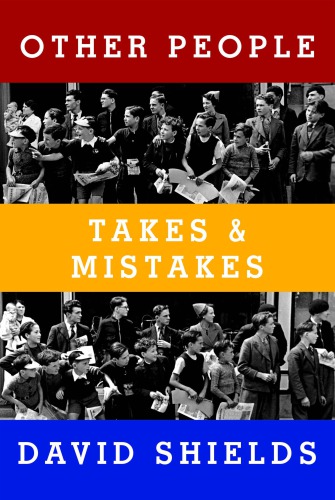
Other People
Takes & Mistakes
کتاب های مرتبط
- اطلاعات
- نقد و بررسی
- دیدگاه کاربران
نقد و بررسی

October 31, 2016
This kitchen-sink compendium of Shield’s work runs the gamut of subject matter and quality. The high points include sharply observed pieces that aren’t quite conventional profiles, such as an appreciation of the actor Bill Murray and a portrait of the University of Washington women’s basketball teammates who revived a star player after she went into cardiac arrest. There are plenty of low points, too, including short pieces of sexual memoir and musings on desire that read as solipsistic. His portrait of radio personality Delilah and her predominantly female audience is economical, evocative, and revealing. In this selection, Shields deftly shows rather than tells, forging a sense of connection to his subject. Many of the best pieces are about sports, including a meditation on Shields’s love for sports movies and an exploration of baseball players whose patterns of thinking impaired their game. Failure typically plays a role in the best pieces, sometimes ruining personal interactions, sometimes inhibiting performance. Though there is a bit too much self-exploration, the persistent bite-size introspections help the reader better appreciate how well Shields can look at others. Agent: P.J. Mark, Janklow & Nesbit.

November 15, 2016
An assortment of musings, cultural critiques, and memoir.In this zesty collection of 74 pieces--some merely paragraphs--revised from work of the last 35 years, essayist, fiction writer, and biographer (of J.D. Salinger) Shields (Writer-in-Residence/Univ. of Washington; How Literature Saved My Life, 2013, etc.) reflects on family, love, contemporary culture, and his sometimes-problematic connection to other people. "I'm drawn to affectless people whose emptiness is a frozen pond on which I excitedly skate," he admits. And: "I have trouble reading books by people whose sensibility is wildly divergent from my own." In five sections, Shields considers Men (mostly his father); Women (many about a college sweetheart); Athletes; Performers (Oprah, Adam Sandler, Bill Murray); and Alter Egos, a motley category that contains essays on Brown, which he attended in the 1970s; infamous memoirist James Frey; and Shields' career as a school-age athlete. "From kindergarten to tenth grade all I really did was play sports, think about sports, dream about sports," he writes. "The body in motion is, for me, the site of the most meaning." Beset with a severe stutter, he hoped that excelling as an athlete would make others forgive him for his "disfluency." He shared a love of sports with his father, who suffered fom bipolar disorder and occasionally disappeared from the family for treatment. In several essays, Shields examines his Jewishness: "self-consciousness, cleverness, involution, ambivalence, pride, shame." And he shows a particular sense of humor: he quotes comedian Milton Berle "turning down a second drink at a Catholic charity event: 'Jews don't drink; it interferes with our suffering.' " Shields credits lifelong back pain with giving him "an invaluable education in the physical, the mortal, the ineradicable wound." He sums up what he learned: "Pain is inevitable," one doctor told him. "Suffering is optional." Many essays end in such aphorisms, and "Life Story" consists entirely of declarations that read like bumper stickers. Uneven but mostly sharp and appealing.
COPYRIGHT(2016) Kirkus Reviews, ALL RIGHTS RESERVED.

February 1, 2017
In his most recent nonfiction work, Shields (The Thing About Life Is That One Day You'll Be Dead) offers portraits of "other people," including family members, lovers, athletes, and celebrities. However, in these essays, Shields also frequently interrogates his notion of self, focusing a lens on his identity in relation to others. The author recognizes this inward gaze and feels the anxiety and ironic distance separating him from his subjects. This may be why he is at his best when he creates more fully realized portraits, such as those of television writer David Milch, basketball player Charles Barkley, and journalist Howard Cosell. This writerly tension, between being enmeshed in the world and at a critical remove from it, persists throughout, articulated most clearly when writing about Bill Murray: "are these just parts of myself in eternal debate, or am I really this anemic? Murray, for all his anomie, likes being in the world. Bully for him. I love standing in shadow, gazing intently at ethereal glare." VERDICT Readers fascinated by "a life limited but also defined by language" will enjoy this work by an established figure in the field.--Doug Diesenhaus, Univ. of North Carolina, Chapel Hill
Copyright 2017 Library Journal, LLC Used with permission.

Starred review from January 1, 2017
I'm not interested in myself per se, Shields wrote in his provocative work, Reality Hunger: A Manifesto (2010). I'm interested in myself as theme carrier, as host. This approach has never been more evident than in his latest book. In dozens of brief essays, most lifted from his previously published books, Shields recasts his work into a hybrid narrative that is at once an essay collection, a memoir, and a critical dissection of pop culture and human relationships. As the title suggests, Shields examines others, namely friends and family and writers, athletes, and celebrities he admires. He portrays his father stalking an actor named Rudolph Schildkraut, convinced they are related. During a sleepover, teenage Shields lies to his know-it-all friend so he'll stop trying to catch his parents having sex. He dissects his love of sports movies and recalls run-ins with O. J. Simpson and Kurt Cobain. But in true Shieldsian form, his musings and observations ultimately bring him back to the subject he knows besthimself, confessing behavioral similarities he shares with George W. Bush and evaluating his literary obsessions through the words of his harshest critics. Wise, surprising, and relentless, Shields demonstrates that life can be art, and so can repurposed ideas.(Reprinted with permission of Booklist, copyright 2017, American Library Association.)

























دیدگاه کاربران